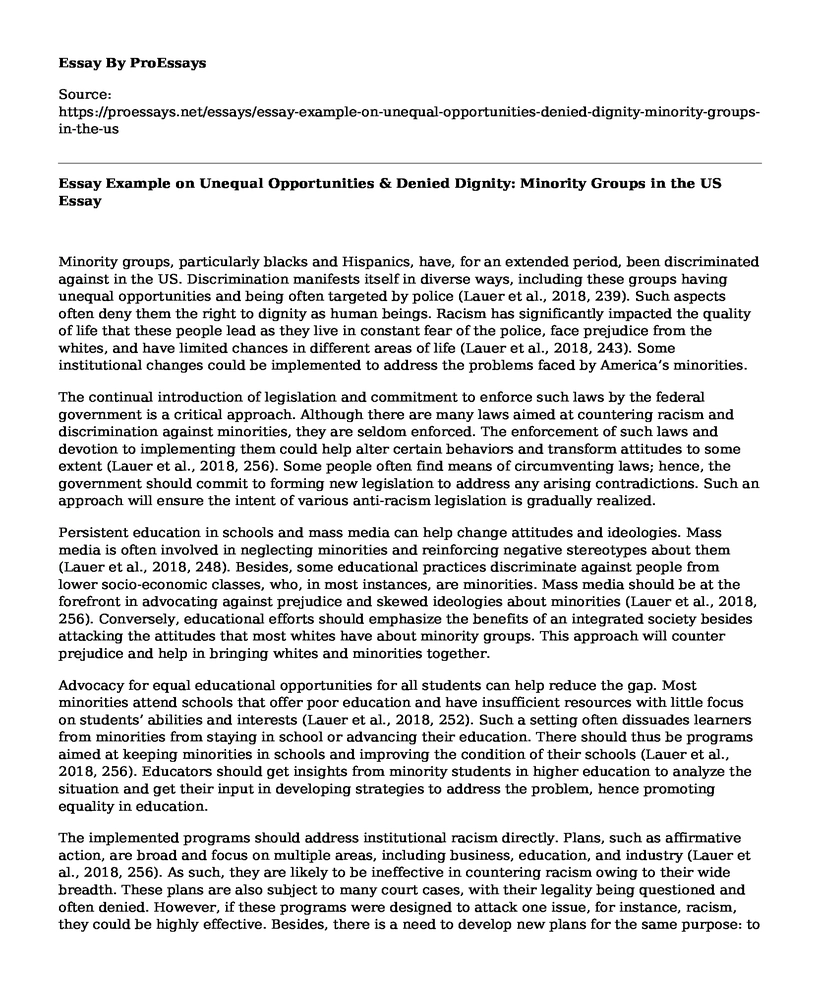Minority groups, particularly blacks and Hispanics, have, for an extended period, been discriminated against in the US. Discrimination manifests itself in diverse ways, including these groups having unequal opportunities and being often targeted by police (Lauer et al., 2018, 239). Such aspects often deny them the right to dignity as human beings. Racism has significantly impacted the quality of life that these people lead as they live in constant fear of the police, face prejudice from the whites, and have limited chances in different areas of life (Lauer et al., 2018, 243). Some institutional changes could be implemented to address the problems faced by America’s minorities.
The continual introduction of legislation and commitment to enforce such laws by the federal government is a critical approach. Although there are many laws aimed at countering racism and discrimination against minorities, they are seldom enforced. The enforcement of such laws and devotion to implementing them could help alter certain behaviors and transform attitudes to some extent (Lauer et al., 2018, 256). Some people often find means of circumventing laws; hence, the government should commit to forming new legislation to address any arising contradictions. Such an approach will ensure the intent of various anti-racism legislation is gradually realized.
Persistent education in schools and mass media can help change attitudes and ideologies. Mass media is often involved in neglecting minorities and reinforcing negative stereotypes about them (Lauer et al., 2018, 248). Besides, some educational practices discriminate against people from lower socio-economic classes, who, in most instances, are minorities. Mass media should be at the forefront in advocating against prejudice and skewed ideologies about minorities (Lauer et al., 2018, 256). Conversely, educational efforts should emphasize the benefits of an integrated society besides attacking the attitudes that most whites have about minority groups. This approach will counter prejudice and help in bringing whites and minorities together.
Advocacy for equal educational opportunities for all students can help reduce the gap. Most minorities attend schools that offer poor education and have insufficient resources with little focus on students’ abilities and interests (Lauer et al., 2018, 252). Such a setting often dissuades learners from minorities from staying in school or advancing their education. There should thus be programs aimed at keeping minorities in schools and improving the condition of their schools (Lauer et al., 2018, 256). Educators should get insights from minority students in higher education to analyze the situation and get their input in developing strategies to address the problem, hence promoting equality in education.
The implemented programs should address institutional racism directly. Plans, such as affirmative action, are broad and focus on multiple areas, including business, education, and industry (Lauer et al., 2018, 256). As such, they are likely to be ineffective in countering racism owing to their wide breadth. These plans are also subject to many court cases, with their legality being questioned and often denied. However, if these programs were designed to attack one issue, for instance, racism, they could be highly effective. Besides, there is a need to develop new plans for the same purpose: to eliminate ethnic and racial discrimination.
Conclusion
Overall, racial and ethnic discrimination has been a significant issue in American society. Minorities are often subjected to prejudice from whites, inequality in educational opportunities, and lopsided attitudes and ideologies from schools and mass media. Nevertheless, this issue could be addressed through several approaches, including a commitment to legislation, affirmative programs, and education and mass media policies. These programs would enhance the quality of life for the minorities and restore their dignity as human beings. They would promote an integrated society devoid of prejudices, hence promoting equality.
Reference
Lauer, Lauer, J. L., & Lauer, J. C. (2018). Social problems and the quality of life (14th Ed.). McGraw Hill.
Cite this page
Essay Example on Unequal Opportunities & Denied Dignity: Minority Groups in the US. (2023, Aug 25). Retrieved from https://proessays.net/essays/essay-example-on-unequal-opportunities-denied-dignity-minority-groups-in-the-us
If you are the original author of this essay and no longer wish to have it published on the ProEssays website, please click below to request its removal:
- A Literary Essay Example: Irony in Counterparts by James Joyce
- Essay on Purpose of Non-Verbal Communication
- Anomie, Social Change, and Crime Essay
- Essay Sample on Family Theory and Domestic Violence
- Essay Sample on Landon's Journey from Isolation to Friendship: A Tinder Story
- Essay Example on Families Evolve: Changing Gender Roles and Acceptance of Different Sexualities
- Paper Example on Believing Women in Islam: Unread Patriarchal Readings of the Qur'an







